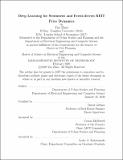Deep learning for sentiment and event-driven REIT price dynamics
Author(s)
Zhao, Yao,M.C.P.Massachusetts Institute of Technology.
Download1237271148-MIT.pdf (6.873Mb)
Other Contributors
Massachusetts Institute of Technology. Department of Urban Studies and Planning.
Massachusetts Institute of Technology. Department of Electrical Engineering and Computer Science.
Advisor
David Geltner.
Terms of use
Metadata
Show full item recordAbstract
This research aims to figure out how textual information in the real estate news can be applied to predicting the price dynamics of REIT (real estate investment trust), a publicly traded security in the exchange whose income is backed up by real estate. Due to the information gap in the market and the sentiment-induced irrational trading behaviors, the market often witnesses the departure of REIT price from its fundamental NAV (net asset value). Traditional REIT pricing models fail to incorporate these behavioral factors and the real time market information, leading to a gap in current empirical studies. With the development of deep learning and natural language processing (NLP) techniques, we are curious about how to properly represent and extract textual information in the real estate news, in a way that allows us to capture the up-to-date market events and irrational sentiment, and incorporate them in REIT pricing. To achieve this goal, I conduct a two-stage analysis. In the first stage, I focus on two NLP tasks, including the sentiment analysis and event extraction. On the end of sentiment analysis, I construct several sentiment measures based on the traditional textual analysis methods. Besides, I train and obtain the sentiment-specific word embeddings on a human-labeled financial news corpus. One the event extraction end, two approaches of event representations are used, which separately corresponds to an unsupervised and a supervised learning model. First, I represent an event as a structured triplet E = (Object₁, Predicate, Object₂), and use an unsupervised NTN (neural tensor network) model to obtain the event embeddings. Second, I follow a supervised model to represent the event in the form of E = (trigger, argument₁, argument₂, ...), and fine-tune a BERT model on the event extraction task. In the second stage, with the help of the sentiment measures, sentiment-specific word embeddings and the pre-trained event embeddings, I implement and compare several deep learning models for REIT price prediction. The best-performing NTN+CNN model greatly outperforms the traditional ARIMA model, in that it decreases the MSE loss by around two thirds, and increases the classification accuracy of price movement by around 8%. The VAR analysis indicates that positive market sentiment granger-causes the REIT price change between 2011 and 2018, while the negative sentiment has no significant effect on the market.
Description
Thesis: M.C.P., Massachusetts Institute of Technology, Department of Urban Studies and Planning, February, 2020 Thesis: S.M., Massachusetts Institute of Technology, Department of Electrical Engineering and Computer Science, February, 2020 Cataloged from student-submitted PDF of thesis. Includes bibliographical references (pages 108-111).
Date issued
2020Department
Massachusetts Institute of Technology. Department of Urban Studies and Planning; Massachusetts Institute of Technology. Department of Electrical Engineering and Computer SciencePublisher
Massachusetts Institute of Technology
Keywords
Urban Studies and Planning., Electrical Engineering and Computer Science.